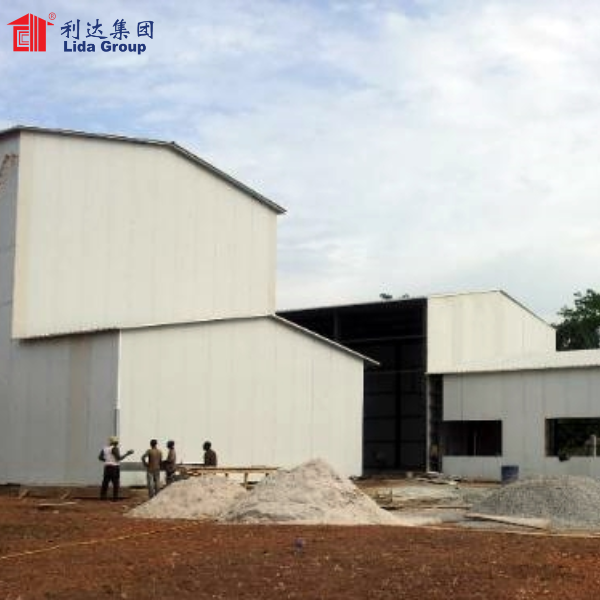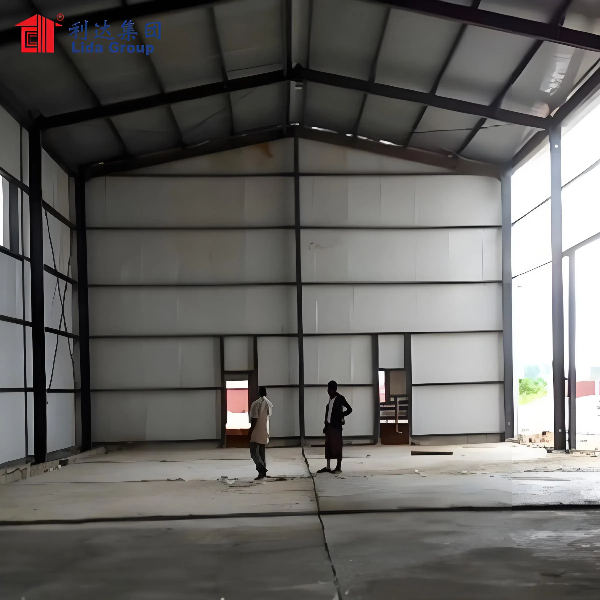Introduction
The manufacturing landscape is undergoing a significant transformation, driven by advances in technology, changing consumer demands, and the need for sustainable practices. As industries adapt to these changes, the construction of manufacturing facilities plays a crucial role in shaping the future. Lida Group, a prominent player in the modular construction sector, is leading the way with its innovative steel structure workshops. This article explores the evolution of manufacturing, the benefits of steel structure workshops, and Lida Group’s commitment to quality and sustainability in this sector.
The Evolution of Manufacturing
1. Historical Context
Manufacturing has evolved dramatically from its origins in small-scale artisan workshops to large-scale industrial operations. The Industrial Revolution marked a turning point, introducing mechanization and mass production techniques. Over the decades, manufacturing processes have continued to advance, particularly with the advent of information technology and automation.
2. Current Trends
Today’s manufacturing environment is characterized by several key trends:
- Automation and Robotics: The integration of automation and robotics enhances production efficiency and reduces labor costs.
- Customization: Consumers increasingly demand personalized products, leading manufacturers to adopt flexible production methods.
- Sustainability: Environmental concerns are driving the need for sustainable manufacturing practices, influencing facility design and operations.
- Digital Transformation: The rise of Industry 4.0 emphasizes the use of data analytics, IoT, and smart technologies to optimize manufacturing processes.
The Role of Manufacturing Facilities
1. Importance of Facility Design
The design of manufacturing facilities is critical to operational efficiency, worker safety, and overall productivity. A well-designed facility can streamline workflows, reduce waste, and facilitate collaboration among teams.
2. Challenges in Traditional Construction
Traditional construction methods often face challenges such as:
- Long Construction Timelines: Building manufacturing facilities using conventional methods can be time-consuming, delaying production start dates.
- Cost Overruns: Unexpected expenses can arise during construction, impacting budgets and financial planning.
- Limited Flexibility: Traditional structures may lack the adaptability needed to accommodate changing manufacturing processes.
Lida Group’s Steel Structure Workshops
1. Overview of Lida Group
Founded in 1993, Lida Group has emerged as a leader in the modular construction industry, specializing in prefabricated steel structures. With a commitment to innovation and quality, the company has successfully completed numerous projects across various sectors.
2. Advantages of Steel Structure Workshops
Lida Group’s steel structure workshops offer several benefits:
a. Durability and Strength
Steel is renowned for its strength and durability, making it an ideal material for manufacturing facilities. Steel structures can withstand heavy loads, harsh weather conditions, and seismic activity, ensuring longevity and reliability.
b. Speed of Construction
One of the primary advantages of Lida Group’s approach is the speed of construction. Prefabricated steel components are manufactured off-site, allowing for quicker assembly on-site. This reduces downtime and accelerates the time to market for manufacturers.
c. Cost Efficiency
While the initial investment in steel structures may be higher than traditional materials, the long-term cost savings are significant. Reduced maintenance, energy efficiency, and lower operational costs contribute to the overall financial viability of steel workshops.
d. Flexibility and Customization
Steel structure workshops can be designed to accommodate various manufacturing processes. Lida Group offers customizable solutions that can adapt to changing production needs, ensuring that facilities remain relevant and efficient.
e. Sustainability
Lida Group prioritizes sustainability in its construction practices. Steel is a recyclable material, and the company employs eco-friendly techniques to minimize waste and energy consumption during the construction process.
The Design Process
1. Initial Consultation
Lida Group begins every project with a comprehensive consultation to understand the specific requirements of the client. This involves assessing the intended use of the workshop, the necessary space, and any unique operational needs.
2. Custom Design Solutions
Based on the consultation, Lida Group’s design team creates customized plans that consider factors such as workflow, safety, and environmental impact. Advanced design software allows for detailed modeling of the structure, ensuring optimal efficiency and functionality.
3. Prefabrication Techniques
The use of prefabrication techniques allows for the production of steel components in a controlled environment. This process ensures high-quality standards and minimizes the potential for on-site errors. Components are then transported to the construction site for assembly.
4. Rigorous Quality Control
Quality control is a cornerstone of Lida Group’s operations. Each prefabricated component undergoes thorough inspections and testing to ensure compliance with industry standards. This commitment to quality contributes to the overall durability and reliability of the finished structure.
5. Efficient On-Site Assembly
Once the components arrive at the construction site, Lida Group’s skilled workforce assembles the structure efficiently. The use of steel allows for quick assembly, reducing labor costs and project timelines while maintaining high-quality standards.
Applications of Steel Structure Workshops
1. Automotive Manufacturing
Lida Group’s steel structure workshops are ideal for automotive manufacturers, providing spacious environments for assembly lines, storage, and logistics operations. The flexibility of steel design allows manufacturers to adapt their facilities as production needs change.
2. Electronics Production
In the electronics industry, precision and efficiency are paramount. Steel structure workshops can be designed to accommodate clean rooms and specialized equipment, ensuring optimal conditions for electronics manufacturing.
3. Food and Beverage Processing
Food and beverage manufacturers require facilities that meet stringent hygiene standards. Lida Group designs steel workshops that facilitate easy cleaning and maintenance, ensuring compliance with health regulations.
4. Aerospace Manufacturing
The aerospace industry demands high-quality, durable facilities for the production of aircraft components. Lida Group’s steel structure workshops can be customized to meet the specific requirements of aerospace manufacturing, including large open spaces for assembly.
5. Renewable Energy
As the world shifts toward renewable energy sources, Lida Group’s workshops can support the manufacturing of solar panels, wind turbines, and other sustainable technologies. The adaptability of steel structures allows for the integration of specialized equipment and processes.
Challenges and Solutions in Steel Workshop Construction
1. Weather-Related Delays
Weather can impact construction timelines. Lida Group mitigates this risk by employing advanced project management techniques that consider local weather patterns and allow for flexible scheduling.
2. Compliance with Regulations
Navigating building codes and safety regulations can be complex. Lida Group’s expertise in local and international regulations ensures that all projects meet necessary compliance standards, reducing the risk of legal issues.
3. Initial Investment Concerns
While steel structures may require a higher initial investment, Lida Group emphasizes the long-term benefits through detailed cost analyses. They provide clients with projections on return on investment, highlighting reduced maintenance and operational costs.
The Future of Manufacturing Facilities
1. Technological Integration
The future of manufacturing facilities will likely see increased integration of advanced technologies. Lida Group is at the forefront of this trend, exploring the use of automation, IoT, and AI to enhance efficiency and optimize production processes.
2. Sustainable Practices
As sustainability becomes a critical focus for manufacturers, Lida Group is committed to adopting greener practices. This includes the use of recycled materials, energy-efficient designs, and sustainable construction techniques.
3. Modular Construction Trends
Modular construction will continue to gain popularity, allowing manufacturers to expand or modify their facilities with minimal disruption. Lida Group’s expertise in modular design positions them well to meet this growing demand.
4. Customization and Flexibility
The trend toward customization will persist, with manufacturers seeking tailored solutions that fit their unique operational requirements. Lida Group’s flexible design approach enables them to provide bespoke workshops that cater to diverse manufacturing processes.
Conclusion
Lida Group’s steel structure workshops represent the future of manufacturing, combining durability, efficiency, and adaptability. As industries continue to evolve, the need for high-quality, sustainable manufacturing facilities will only increase.
Through their commitment to innovation and quality, Lida Group is well-positioned to lead the way in modular construction. Their steel structure workshops provide manufacturers with the tools they need to thrive in a rapidly changing environment, ensuring they remain competitive and responsive to market demands.
As we look to the future of manufacturing, Lida Group’s vision and expertise will undoubtedly play a vital role in shaping the next generation of manufacturing facilities, driving progress and sustainability across the industry.
Contact Us
Post time: Sep-11-2024


